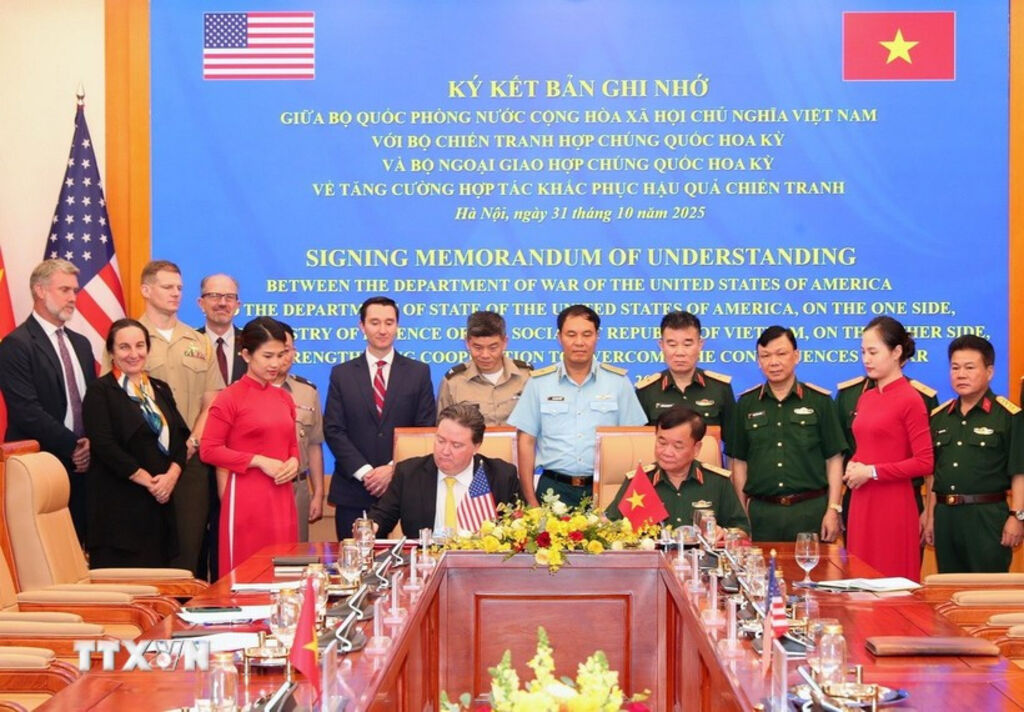 |
| Deputy Minister of National Defense Senior Lieutenant General Hoang Xuan Chien and US Ambassador to Vietnam Marc Knapper sign the memorandum of understanding on enhancing cooperation in addressing the legacies of war in Hanoi on October 31__Photo: VNA |
Vietnam and the US signed a memorandum of understanding on enhancing cooperation in addressing the legacies of war in Hanoi on October 31.
The event was co-chaired by Senior Lieutenant General Hoang Xuan Chien, Deputy Minister of National Defense and head of the National Steering Committee on the settlement of post-war unexploded ordnance and toxic chemicals in Vietnam (Steering Committee 701), and US Ambassador to Vietnam Marc Evans Knapper.
The MoU aims to realize high-level commitments made by the two countries in the 2023 Joint Statement on upgrading Vietnam–US relations to a Comprehensive Strategic Partnership for peace, cooperation, and sustainable development. It also draws on the 2024 Vietnam–US Joint Vision Statement on defense cooperation and updates the 2011 MoU between the Vietnamese Ministry of National Defense and the US Department of Defense (now the Department of War), revised in 2022.
Colonel Can Anh Tuan, Deputy Director of the Ministry of National Defense’s Military Science Department and Chief of the Office of Steering Committee 701, said the MoU will strengthen collaboration in five key areas: clearing unexploded ordnance; improving the quality of life for people with disabilities in provinces heavily affected by Agent Orange; remediating dioxin contamination at Bien Hoa Airport; and supporting the search, recovery, and identification of Vietnamese soldiers’ remains; and delivering comprehensive cooperation in locating US servicemen missing in action (MIA) in Vietnam.
Efforts will focus on sharing information, documents and artefacts, providing training, conducting scientific research, promoting delegation exchange, organizing conferences and workshops, and strengthening media cooperation under the MoU.
Both sides have clarified their roles and established joint working groups to facilitate coordination, planning, and evaluation. The Vietnamese team is led by the Chief of the Office of Steering Committee 701, while the US team is headed by the Political Counselor representing the US Department of State and a senior official representing the US Department of War.
Chien highlighted the significance of the MoU as part of activities to celebrate the 30th anniversary of diplomatic relations between the two countries. He noted the success of past cooperation, including the remediation of dioxin-contaminated areas at Da Nang Airport, ongoing efforts at Bien Hoa Airport, and improving the lives of more than 30,000 Agent Orange/dioxin victims and people with disabilities in six heavily affected provinces.
He also mentioned the recovery and repatriation of over 990 sets of remains of US servicemen, capacity-building training for Vietnamese personnel involved in post-war ordnance clearance, and the provision of around 800,000 pages of documents and artefacts by US individuals and organizations to support search and recovery efforts.
He emphasized that the MoU demonstrates a strong commitment by the US Department of War and Department of State, and Vietnam’s Ministry of National Defense - the standing agency of Steering Committee 701 to deepen cooperation in war legacy remediation. He expressed confidence that the agreement will serve as a foundation for further close collaboration and significant achievements, completing the remediation work and reinforcing trust in the robust development of the Vietnam–US Comprehensive Strategic Partnership for peace, cooperation, and sustainable development.
Echoing Chien's views, Ambassador Marc Evans Knapper praised the achievements of both countries in this cooperation and acknowledged Vietnam’s contributions, particularly in locating MIAs. He stressed that the signing of the MoU reaffirms strong bilateral cooperation and provides a solid foundation for developing relations across other fields, raising Vietnam–US relations to new heights in the years ahead.- (VNA/VLLF)









